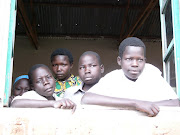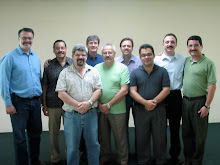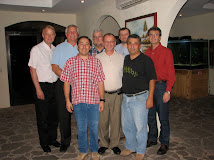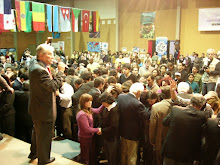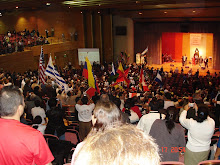Carlos Scott
Acts 13:1-3 “Now in the church that was at Antioch there were certain prophets and teachers: Barnabas, Simeon who was called Niger, Lucius of Cyrene, Manaen who had been brought up with Herod the tetrarch, and Saul. As they ministered to the Lord and fasted, the Holy Spirit said, ‘Now separate to Me Barnabas and Saul for the work to which I have called them.’ Then, having fasted and prayed, and laid hands on them, they sent them away.
From this story, we know that the church of Antioch played a very important role in the life of the universal church of the first centuries. It was a church that crossed social boundaries, built up broken lives, covered physical and spiritual needs, resolved interpersonal and doctrinal conflicts as described with the Jerusalem Council, had a shared leadership forming a pastoral team, and was willing to extend the limits of the kingdom to the ends of the earth.
We wonder as a church: What will be the work for which the Lord has called us in the coming year, and the new challenges that He will place in our hands? What is the direction we must go, and how must we plan for it? How can we understand that we are a church on mission? Who must we appoint for the ministry? How will the next pastors and cross-cultural missionaries be? Antioch was an open door for the evangelization of the world. We as Iberoamericans are challenged to follow this model.
The church living in mission is a church that understands itself to be sent to the world. It is a church that looks for God’s purposes, participating actively in worship of the Lord, called to live a Trinitarian faith, a relational faith, a life in relation with God and with our neighbor; a relation of communion with one another, where our priority is in being, not doing.
As servants, we understand that when we are involved in the mission, we are sharing the mission of our missionary God, and we are not working for any personal project. We are in the service of the Missio Dei, and our mission is to share His. We listen, we discover and we obey the voice of the Lord, sending His servants to the work to which He has called them. This is the model to follow (Acts 13:1-3).
It is interesting when we study the book of Acts to observe how the church goes through stages; the church in Jerusalem was the initial center of the activity of the church, then Antioch. After the persecution, the action center moved from Antioch to Syria. Jerusalem had its moment, and now it was coming toward a new era in which it would be necessary to respond to the unreached, and it is then that the church in Antioch assumes this commitment. Luke talks about this congregation not because it is the richest or the most powerful, but because it knew how to accept the challenges of the moment.
Later when we read Acts 15 we find the difficulty that some Christians coming from Judea who visited Antioch had with Jews who were not circumcised and therefore believed they could not be saved. Paul, Barnabas, and some other believers sent by the church decided to resolve this conflict of values in the Council of Jerusalem. What is the reason that Paul, Barnabas and those that were with them could see what God was doing among the unreached, and, on the other hand, the Pharisees could not? They had accepted Jesus as the Messiah and participated in the life of the church. Where was the difference? The radical difference was in that, while the Pharisees had received the gospel, the church of Antioch, in addition to receiving it, had united with the mission of God in the world. And from there was thrust the missions endeavor. The Spirit was active in Jerusalem, but it was in Antioch where the Spirit was doing new things, opening doors and expanding horizons. There the church was subject to the impulse of the Spirit.
The missions of all the people of God
Every Christian is called to participate and exercise the universal priesthood of believers. The mission has its place wherever it wants. Impelled by faith, the Christians crossed the border between those who believe and those who don’t believe, and on the other side of this border they gave testimony of their faith. Today, as a church, we are confronted with great challenges, like the 4,000,000 people who still do not know the Lord. The church must fully assume, without delay, its responsibility in world evangelization. It is a command, because there are millions of people that still do not have access to a clear presentation of the gospel. The church together is responsible for the evangelization of all people and races, of all languages. A universal faith, but one that is not a missionary faith, is nothing more than rhetoric without authority that makes it sterile. To complete the work demands that we cross geographic, cultural, social, linguistic and spiritual borders, and that we accept all the consequences that requires.
Dimensions of a new missionary paradigm
The challenges also include great multicultural cities, the re-evangelization of the West, testifying in the world of religious plurality among unreached ethnic groups where they are found (whether that be in large cities or in restricted access countries); linguistics and translation, contextualization; being agents of reconciliation in a world of violence, of displaced people, of refugees, of immigrants, in the midst of religious persecution and an immense amount of suffering. More Christians died in the 20th Century than in the previous nineteen centuries.
We must assume our role in questions of the environment and all of God’s creation; this challenge implies also responsible and effective participation in the society; the deepening of Biblical knowledge through systematic teaching in local churches, and the maturing of leadership models that promote teamwork and active participation of believers. We need to have a real understanding of the unity of the people of God, a greater participation in the world missions movement, becoming participants in the universal church, sharing the global challenges in an integrated action of the gospel; a sincere search for cooperative models; and we need to understand missions as a process and not as a project.
Missions mobilization
In the first COMIBAM (Iberoamerican Missions Cooperation) Congress in San Pablo, Brazil in 1987, they estimated the Iberoamerican missions movement to be approximately 60 organizations that sent some 1,600 cross-cultural missionaries.
Ten years later, in preparation for the second COMIBAM Congress in Mexico in 1997, a more systematic research was done with the goal of evaluating the missions movement of the past decade. It was concluded at that time that there was more or less 300 sending organizations and a little more than 4,000 cross-cultural missionaries.
According to statistics from 2006, Iberoamerica has more than 9.000 missionaries sent to other fields, and some 400 sending organizations. We give thanks and glory to God for this growth, but we are also conscious that missions mobilization continues to be one of our principle challenges.
We are a capable missions movement, but we are still not a missions movement that has come to a point of developing all of its potential to bless all nations. Despite the number of Iberoamerican evangelicals (70 millions), still we observe that there is not a correlation with a greater sending of missionaries to the least evangelized or unreached peoples. At the same time, there is a growing concern about the sending of missionaries without adequate training, without strong financial support, adequate pastoral care and provision for their return.

Unity and cooperation
The Word of God encourages us to live worthy of the calling which we have received. We are challenged to live in humility, being kind, patient, and tolerant of one another in love. We are challenged to maintain unity in the bond of the Spirit. One body, one Spirit, one Lord, and one God and Father of all (Ephesians 4:16). From the beginning, the Lord has challenged us to work in team. The mission could be the foundation for our unity. Cooperation in the practical task of missions is the first step towards a deeper unity. We will grow in our testimony based on the unity of Christ, that calls us all to participate in God’s mission.
But speaking of a global cooperation raises some questions that we must answer: Will we mutually help one another? How can we build a better missions bridge of cooperation? Should our structures be improved, changed or suspended? Should we rethink our missional understanding in order to better our missions dialog? What will be our participation in the sending of missionaries from the third world to other continents or the West? What principles and values must we follow? What is it that we must do? What is the cost that we must pay? What is our calling and what is our passion?
Participate helping others through cooperation
The passion of the gospel must make us participate, cooperate and share (Philippians 1:5), and not to compete. We can speak of “communion,”– koinonia, the New Testament word translated as communion, sharing, contribution, or in common. What is clear is that the idea is of sharing something, a business, a purpose, an experience, money, whatever, but it must be shared. The apostle Paul says, “Brethren, join in following my example, and note those who so walk, as you have us for a pattern.” Common faith must have an expression in practical participation and this participation has concrete consequences.
We are called to serve one another because of the passion we have for the gospel. We need each other (I Corinthians 12:21-22). We are members one with another. No one can say to another, “I don’t need you” (2 Corinthians 10:12, 17-18). This is sin and we must repent. Our problem, many times, is to think that we don’t need anyone, and we miss out on sharing with others.
So that cooperation can exist, there needs to be a level of trust that is difficult to build when someone seems to be self-sufficient. The beauty of the incarnation of Jesus Christ, being God, is that he humbled himself voluntarily, to be among us.
We ask ourselves: how can we build a better missions bridge of cooperation?
In theory, the answer we have is that we must relate to one another. The problem comes when we don’t appreciate the relationship we have with others. We must have unanimity with the Father’s plans (Luke 6:27-31). This unanimity with Him speaks to us about being like-minded and being of one accord (Philippians 2:1-11). We speak of forgiving one another, of humbling ourselves, of understanding our different cultures and mutually helping one another. There is no one who is better, no one inferior. It also means that we have to work on better communication, on face-to-face relationships. Our problem is that many times we don’t appreciate personal contact, and we say to ourselves, “Why am I going to go see him/her?” “Why waste the time?” As servants, our presence, our commitment, our flexibility and our cooperation and indispensable. Together with this, we must enrich the dialog among the body of Christ: the global church. There is no North or South, East or West, there is only one body. When we serve through cooperation we can say what the apostle said of Epaphroditus, “a sweet-smelling aroma, an acceptable sacrifice, well pleasing to God” (Philippians 4:18).
The fact that we can decide together to do missions would be a sign of the defeat of Satan and evidence of unity and global cooperation. The fact of what we can do together with our differences in cultures, of wealth, of backgrounds; will require the help of the Holy Spirit and the willingness to sacrifice our own needs for the best of the mission. We are from different countries challenged to be citizens of heaven (Philippians 3:20) and this reminds us that we have a future in common and the same identity.
As a church, we take part in the mission of God in the world announcing that: “The time is fulfilled, and the kingdom of God is at hand. Repent, and believe in the gospel” (Mark 1:15). We will take the gospel to all nations until the Lord returns. This is our understanding of the mission, with the participation, with our eyes fixed on the kingdom of God.















